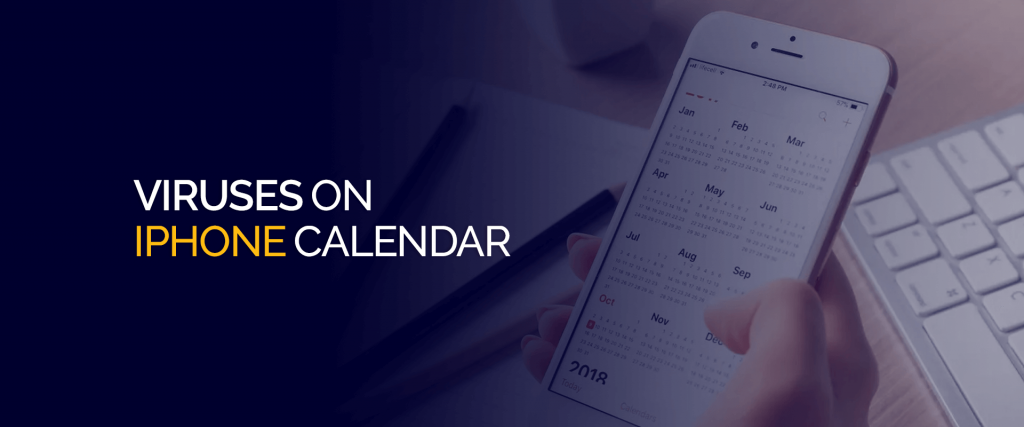

Get 93% OFF on Lifetime
Exclusive Deal
Don’t miss out this deal, it comes with Password Manager FREE of cost.
Get 93% off on FastestVPN and avail PassHulk Password Manager FREE
Get This Deal Now!By Nick Anderson No Comments 5 minutes
Have you been noticing strange and unknown text on your iPhone’s calendar? Your phone might be infected with malware. Malware is a term to define malicious software whose sole purpose is to infect a device and mess with the system’s operations. Malicious software is also used to invade user privacy and steal data from a device. If you have noticed unusual behavior on your iPhone, it’s time to clean the device. Follow this blog as we explain the easiest ways to remove the iPhone calendar virus.

A virus is a malware that infects and interrupts the normal functioning of a device. But a virus is just one of many types of malware that plague computers, each being different in execution and damage. From self-replicating viruses to ransomware that locks you out of your data, malware is an ever-persistent threat to the security of your device.
If your device has been infected with malware, it will exhibit odd behavior, such as:
iPhone is the leading smartphone brand globally, with more than 1 billion active users. It makes iOS a target for hackers to carry out malicious attacks. We have seen many examples of malware on iPhone in the past; one of the common issues is a virus on the iPhone calendar that spams users within the app.
Spam messages will resemble warnings that say that your iPhone is unsecured and needs protection.
But here’s the fact about this virus on iPhone: it’s not actually a virus. Although it displays something that a device infected with a virus typically does, it has to do with a calendar account instead.
A malware infects a device and resides in the storage or memory, but that’s not the case here. The spam messages are being pushed to the calendar app through an account. It could have happened through a popup or a phishing link you received via email or SMS. Once you interact with such malicious objects, bad things can happen to your device.
So, without going on too much, let’s look at how to remove iPhone Calendar Virus.
The spam messages should now be free from the Calendar app.
Whether you use an iPhone or any Android phone, the threat of malware is real. Attackers look for vulnerabilities in systems and develop malware to exploit those vulnerabilities. Some malware can evade detection and work stealthy, like the Pegasus spyware. But more often than not, malware infection occurs due to bad security practices.
Phishing is a malicious attempt to trick a user into giving up information or data, usually through creating a sense of urgency or impersonating an authority of power. A phishing email can alert you that your iCloud account has been blocked and requires that you log in to reactivate it. The link in the email will take you to a page designed to look like Apple’s official website and feel authentic. But the moment you type in your username and password, the credentials will leak to the hacker who built the web page.
Other ways include downloading malicious apps, clicking on links in texts from unknown senders, or using public Wi-Fi without encryption.
The first thing is to adopt certain practices that limit your exposure to malicious attacks, such as the iPhone calendar attack. Always verify the sender’s address; never click on links from unknown sources. If you receive a text asking you to click on a link or a popup on a website asking for permissions, do not click on it.
Make it a point to use a VPN when connected to public Wi-Fi. A VPN encrypts your internet traffic so that any hacker monitoring the wireless exchange of data cannot sniff your data packets and potentially divert you to malicious domains through a rogue access point.
An antivirus will go a long way to ensure protection from malware on iOS. A VPN can encrypt data while it’s in transit, and antivirus will ensure that your device is protected from malware that tries to execute in the background.
iPhones are regarded as more secure than Android devices due to several reasons, one of them being the inability to sideload apps. But iPhones are not full-proof; vulnerabilities can always exist. It’s these vulnerabilities that hackers seek to exploit to spread malware. You can adopt certain best security practices to limit your exposure to malicious attacks.
© Copyright 2025 Fastest VPN - All Rights Reserved.


Don’t miss out this deal, it comes with Password Manager FREE of cost.
This website uses cookies so that we can provide you with the best user experience possible. Cookie information is stored in your browser and performs functions such as recognising you when you return to our website and helping our team to understand which sections of the website you find most interesting and useful.
Strictly Necessary Cookie should be enabled at all times so that we can save your preferences for cookie settings.
If you disable this cookie, we will not be able to save your preferences. This means that every time you visit this website you will need to enable or disable cookies again.